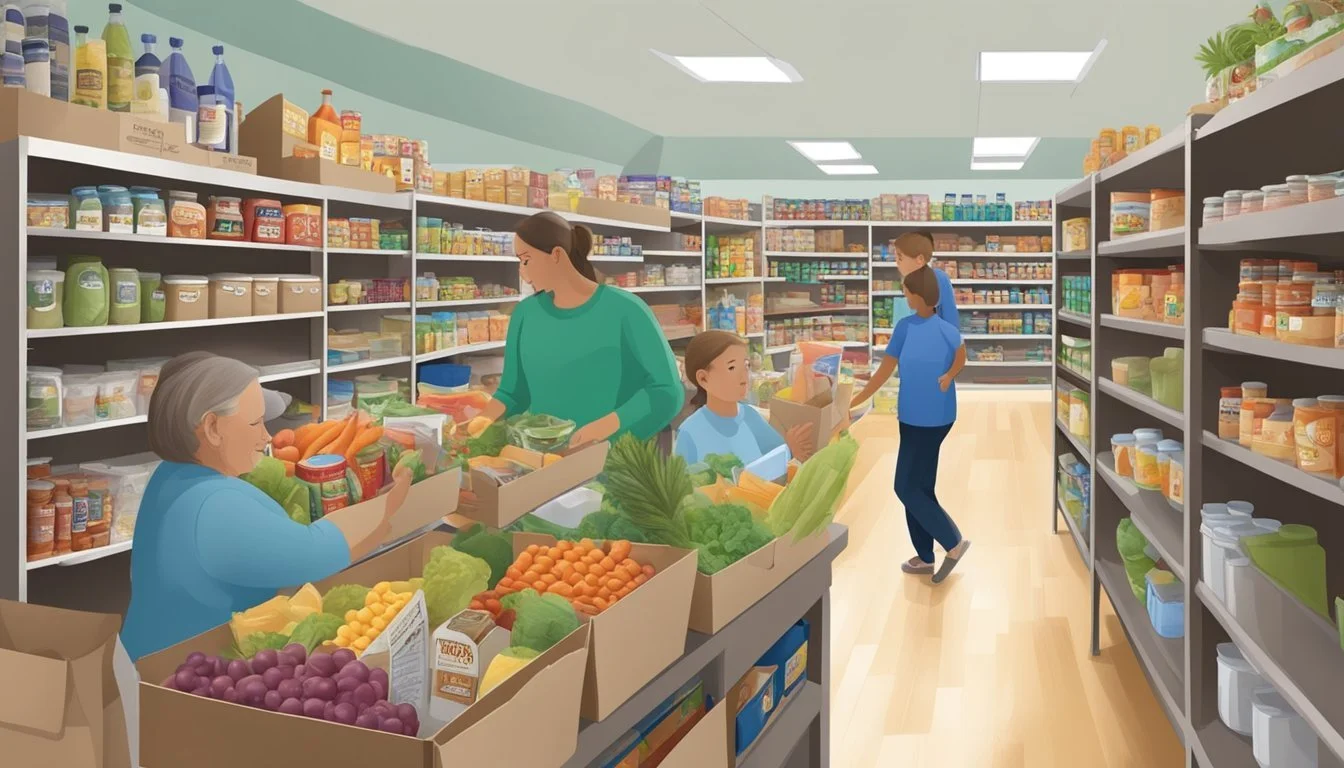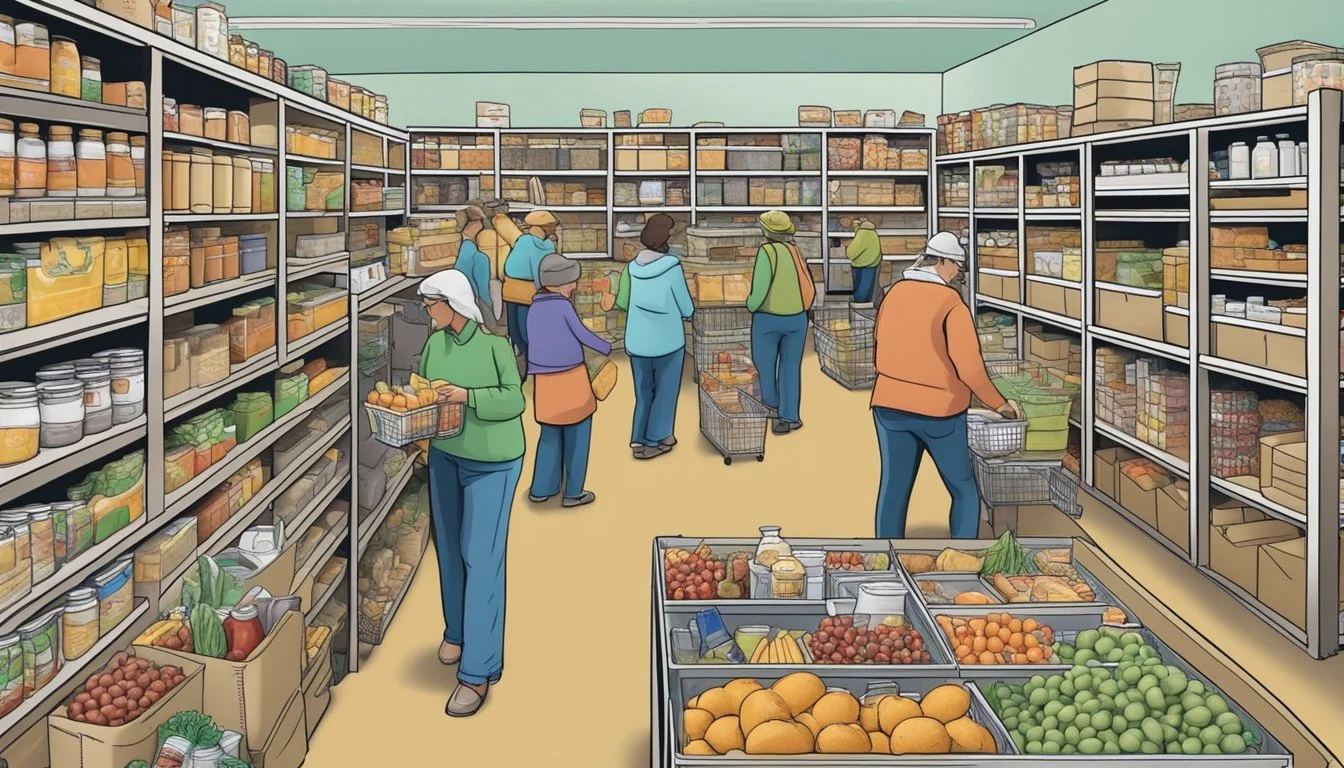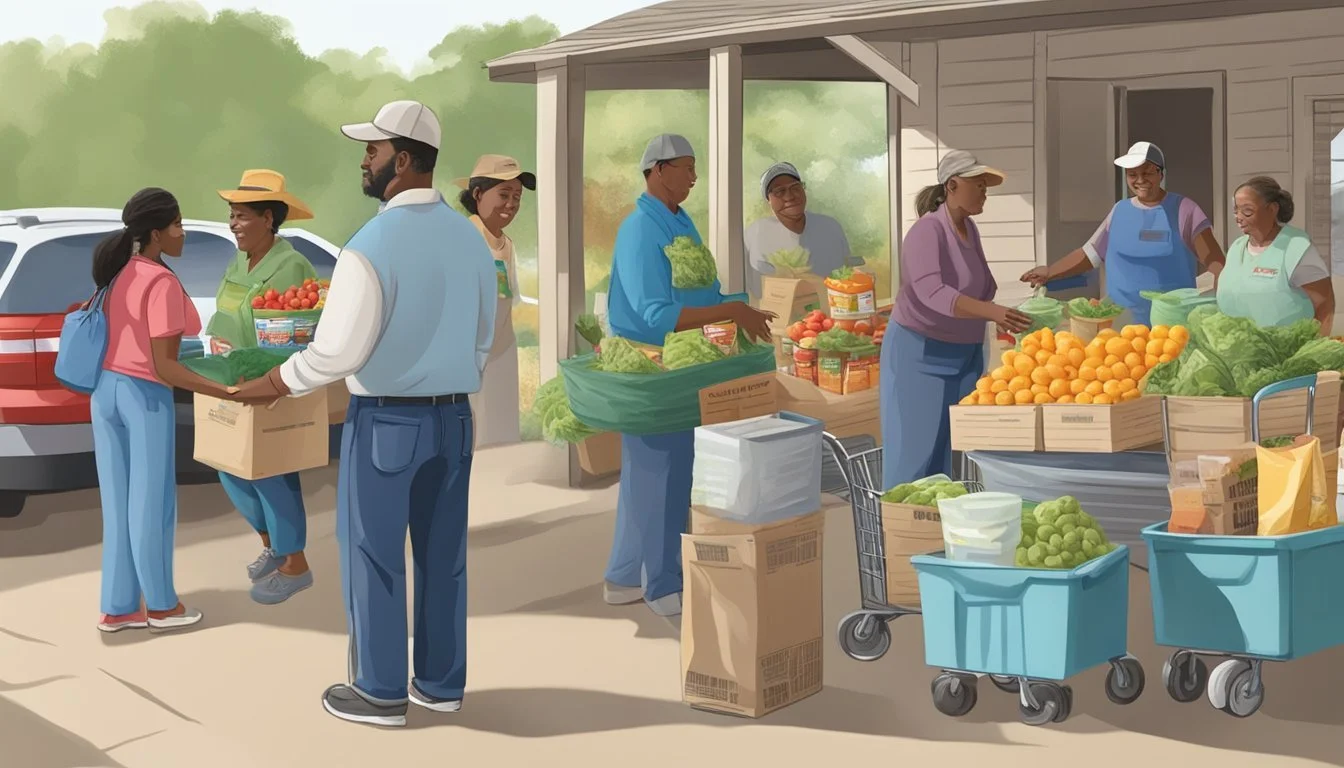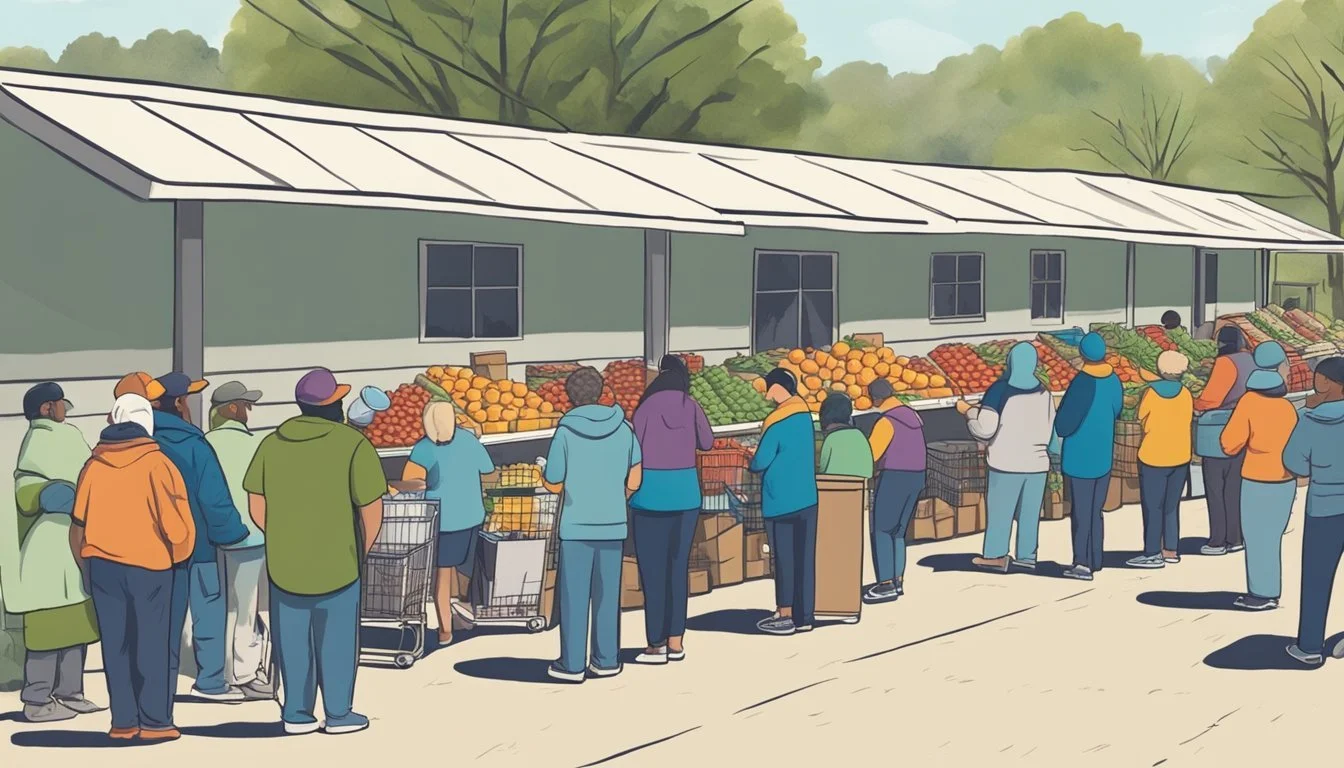Free Groceries and Food Pantries in Sutton County, Texas
Your Guide to Local Assistance
This Article is Part of Our Guide on Free Groceries in Texas
In Sutton County, Texas, residents facing food insecurity have the option to access free groceries and food assistance through a variety of programs and services. The community benefits from these essential resources, ensuring that individuals and families in need can obtain nutritious food. Food insecurity, a challenge for many across the United States, impacts individuals from all walks of life. By providing these services, Sutton County helps to alleviate the stress of food scarcity for its residents.
Among the support systems in place is the Sutton County Food Pantry and Resource Center, strategically located in Sonora, Texas. The center operates on a monthly schedule, opening its doors every fourth Tuesday to distribute groceries to those in need. This pantry joins a network of hunger relief efforts that span the nation, including the contributions from Feeding America, a national organization dedicated to ending hunger.
Beyond local food pantries, residents of Sutton County may also benefit from federal assistance programs such as the Supplemental Nutrition Assistance Program (SNAP) and the Special Supplemental Nutrition Program for Women, Infants, and Children (WIC). These programs provide eligible participants with benefits that can be used to purchase food items, including baby formula from WIC. Through the combined efforts of local and federal programs, residents in Sutton County have access to the necessary support that fosters a more food-secure community.
Understanding Food Insecurity in Sutton County
Food insecurity is a pressing issue in Sutton County, affecting individuals and families who lack consistent access to adequate food. Financial challenges and low income levels are key contributors to this situation, with many residents finding themselves uncertain of where their next meal will come from.
Key Factors Influencing Food Insecurity:
Economic Stability: Economic fluctuations have a direct impact on food insecurity, with a rise in unemployment often leading to an increase in the number of food-insecure households.
Accessibility: For some residents, physical access to food sources like grocery stores and pantries can be a barrier, further exacerbating the issue.
In response to these challenges, Sutton County has initiatives aimed at providing relief to those in need:
Food Pantries: Local food pantries play a critical role in alleviating hunger, offering free groceries to qualifying individuals and families.
Government Assistance Programs: Programs like SNAP and WIC provide essential benefits that help low-income families purchase food.
Income's Role in Food Security:
Household income is a significant determinant of food security. Low-income families in Sutton County may struggle more with food insecurity due to the higher proportion of their budget that must be allocated to basic necessities, including food.
Efforts to Mitigate Food Insecurity:
Community organizations collaborate to address immediate needs and work towards long-term solutions.
Drive-thru pantries and targeted assistance programs aim to improve the reach to food-insecure populations, providing a convenient way to obtain nutritious food.
By understanding the nuances of food insecurity in Sutton County, stakeholders can target their strategies to ensure that all residents have access to sufficient, nutritious food.
Local Food Banks and Pantries Overview
Access to free food assistance is a crucial community resource for residents facing food insecurity. Sutton County maintains a network of food banks and pantries, along with partner organizations, to ensure that no one in the community goes hungry.
Sutton County Food Banks
The mainstay of food assistance in Sutton County is the local food bank. It is a non-profit hub that collects, stores, and distributes food to the community through a series of pantries. Individuals and families in need can receive a variety of grocery items including fresh produce, dairy products, and non-perishable goods. The food bank operates with the help of volunteers and donations, ensuring resources are continually replenished.
Operating Hours:
Monday - Friday: 9:00 AM to 4:00 PM
Saturday: 10:00 AM to 1:00 PM
Services Provided:
Food distribution to individuals and families.
Support for soup kitchens and meal programs.
Emergency food assistance.
Partner Organizations
Sutton County's food bank collaborates with an array of partner organizations to expand its reach and efficacy. These partners include local charities, faith-based groups, and community centers, all playing a pivotal role in distributing food and offering support services. They are vital in identifying and reaching individuals who may not have direct access to the food bank, such as the elderly or disabled.
Services Offered by Partners:
Mobile pantries for remote distribution.
Drive-thru pantries for safe and convenient pick-up.
Access to resource guides and SNAP program assistance.
By working cohesively, these entities ensure that food assistance is accessible to all residents of Sutton County, exemplifying a strong and responsive community resource network.
How to Access Free Groceries
In Sutton County, Texas, individuals and families can access free groceries through various programs designed to support those with limited income. The main avenues involve meeting specific eligibility criteria and going through an application process to receive assistance.
Eligibility Criteria
Free Food and Groceries:
Income: Applicants typically need to demonstrate financial need, falling below a certain income threshold.
Zip Code: Services are often specific to Sutton County residents; applicants must provide proof of residence.
Application Process
Step 1: Locate nearby food pantries or government assistance programs such as SNAP.
Step 2: Gather required information, which may include income verification, ID, and proof of residence.
Applications can usually be completed online, by phone, or through a visit to a local food bank or pantry. It is advisable to contact the desired program directly for the most accurate information regarding the application process and required documents.
Support Services and Programs
Residents in Sutton County, Texas have access to various programs that provide assistance with groceries and nutritional support. These services are designed to help individuals and families meet their dietary needs.
Supplemental Nutrition Assistance Program (SNAP)
The Supplemental Nutrition Assistance Program (SNAP) offers financial assistance to buy groceries. Eligible residents can receive a SNAP EBT card, which is preloaded with funds each month. These funds can be used at participating stores to purchase qualifying food items. To be eligible, applicants must meet certain income and household criteria.
Eligibility: Based on income, resources, and household size
Benefits: Funds on an EBT card for food purchases
Special Supplemental Nutrition Program for Women, Infants, and Children (WIC)
WIC is a program specifically targeted at helping pregnant women, new mothers, and young children access nutritious foods. The program provides benefits which can be used to buy specific food items that are rich in nutrients essential for growth and development.
Eligibility: Pregnant women, breastfeeding women, women who have recently given birth, infants, and children up to the age of 5
Benefits: Vouchers or electronic benefits to purchase nutritious foods such as milk, eggs, and whole grains
Operating Hours and Locations
Residents in Sutton County, Texas seeking assistance with groceries have access to multiple food pantry services. These include traditional food pantries with set operating hours and convenient drive-thru options for easy pick-up.
Food Pantry Hours of Operation
Mountain CAP of WV, Braxton Office
Address: (Specific location in Sutton, WV)
Hours: Monday - Friday, 8:00 AM - 4:00 PM
Sutton Food Pantry, Sutton MA
Address: 19 Hough Road, Sutton, MA (next to Sutton Senior Center)
Hours: Monday - Friday, 8:00 AM - 3:00 PM
Contact: Senior Center at 508-234-0703
Drive-Thru Pantry Schedules
Drive-thru pantries offer an efficient method for individuals and families to collect food without having to leave their vehicle, ensuring convenience and safety. While specific dates and times for drive-thru pantries in Sutton County, Texas, are not listed, residents can usually find information by contacting local food banks or visiting the Feeding America website and entering their zip code. It's typically advisable to call ahead or check online resources for the most up-to-date schedules and availability.
Volunteering and Community Support
In Sutton County, the strength of food assistance services relies heavily on volunteers and the benevolence of community donations. These two pillars are crucial in sustaining the food pantries' operations and ensuring that those in need receive free groceries.
Volunteer Opportunities
Volunteers play a vital role in the functionality of food pantries in Sutton County. Individuals interested in offering their time can find several ways to get involved:
Sorting and Packing: They may assist in organizing and packaging food items for distribution.
Distribution: Volunteers can help in handing out the food during pantry hours.
Fundraising: They can also support by participating in or organizing fundraising events.
Advocacy: Enthusiasts can help raise awareness about hunger issues in the community.
Each food pantry has its own system for recruiting volunteers, with most listing available shifts and opportunities on their websites or local community boards.
How to Donate
Donations serve as the lifeline for food pantries, and there are multiple avenues through which one can donate:
Monetary Contributions: Monetary gifts are always welcomed as they allow pantries to purchase fresh and diverse food items.
Food Donations: Non-perishable food donations can be dropped off at designated locations. Preferred items include canned goods, rice, pasta, and cereals.
Corporate Partnerships: Businesses may partner with food pantries for regular contributions or matching donation programs.
The community's involvement, through both volunteer work and donations, ensures a well-stocked and operational pantry, that can serve the county's residents effectively.
Outreach and Education Programs
In Sutton County, Texas, food assistance education and outreach programs play a vital role in combating food insecurity. Feeding America, a nationwide network of food banks, anchors the effort by collaborating with local institutions to facilitate various programs aimed at providing nutrition education and resources to the community.
Feeding America:
Nutrition education: Empowers individuals by informing them about healthy eating choices and proper nutrition.
Awareness initiatives: Increases visibility about food assistance availability, including benefits like the Supplemental Nutrition Assistance Program (SNAP).
Schools:
School-based food pantries: Assists students and their families by providing convenient access to food in a familiar environment.
Education: Incorporates modules on nutrition and food resources into school curriculums, fostering a well-informed younger generation.
Outreach Activities Description Pantry Services Awareness Educates community about local pantry hours and services. Resource Fairs Engages public and distributes information regarding food assistance programs. Collaborative Events Partners with other non-profits for broader community reach and support.
Local education and outreach programs in Sutton County are essential for ensuring that families and individuals are informed about the resources available to them. These initiatives not only provide immediate food assistance but also promote self-sufficiency and knowledge to create sustainable solutions to hunger.
Addressing Nutritional Needs
Community initiatives in Sutton County are focused on ensuring that residents have access to nutritional meals. These programs are specifically tailored for vulnerable groups such as seniors and children, providing not only sustenance but also nutrition education and access to healthy food choices.
Meal Programs for Seniors and Children
In Sutton County, meal programs cater primarily to the nutritional requirements of seniors and children. Resources such as local food pantries collaborate with national networks like Feeding America to establish these programs, ensuring that regular, balanced meals reach these groups. Senior centers often host communal dining experiences, while schools and after-school programs typically include lunch and sometimes breakfast or snacks, emphasizing the importance of supporting growth and health in children through proper nutrition.
Healthy Food Options
Beyond meeting basic needs, Sutton County emphasizes the availability of healthy food options. Food assistance programs, including local pantries, strive to offer a varied selection of nutritious foods. They focus on providing:
Whole grains
Lean proteins
Dairy products
These items are essential for a balanced diet, helping to prevent chronic diseases and supporting overall well-being. Nutrition education is often provided alongside food assistance to encourage healthy eating habits within the community.
COVID-19 Impact on Food Assistance
The arrival of the COVID-19 pandemic exacerbated existing challenges in food security, compelling Sutton County, Texas, to make significant alterations to its food assistance programs and emergency food distribution efforts to meet the heightened needs of its residents.
Changes to Food Assistance Programs
During the COVID-19 pandemic, food assistance programs in Sutton County saw a swift evolution to address the surge in demand. Sutton County food pantries adapted with changes like expanded hours of operation and the implementation of contactless delivery options to maintain safe access to food. Federal assistance played a critical role, with the USDA expanding its Nutrition Assistance Programs, including increasing benefits and providing more funding to local food banks.
USDA Response: Expansion of benefits and waivers to facilitate easier access to programs.
Emergency Food Distributions
The county’s emergency food distribution networks experienced a marked increase in utilization, as many individuals and families found themselves requiring assistance for the first time. The distribution of free groceries through food banks and pantries became a lifeline for the community. Food banks reported a surge in the number of users, which aligns with national trends indicating a substantial increase in food bank reliance during the pandemic.
User Statistics: Comparing 2019 usage rates to the pandemic period shows a significant rise in the number of households utilizing food pantries.
Beneficiaries found support through charitable food services, which were paramount in maintaining food security and sustaining diet quality when the pandemic induced economic strains on household incomes. Local responses included organizing large-scale food distribution events and setting up additional temporary food distribution sites to manage the increase in demand.











